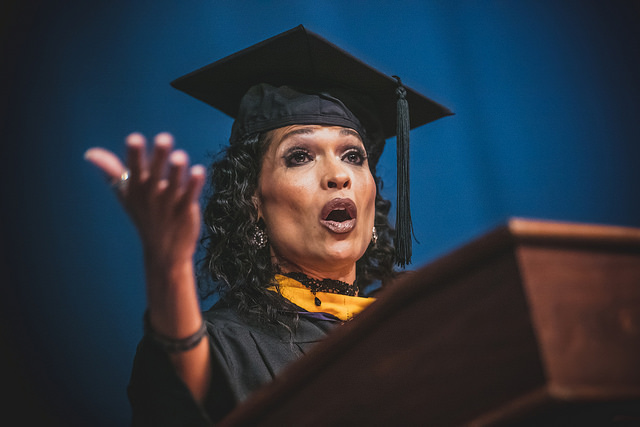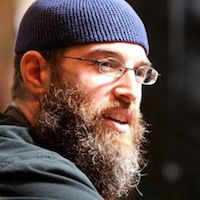It’s the season of college graduations.
Young adults across the country are donning their gowns and tassels and getting ready to head out into the “real world.”
Best of luck, kids!
The leap from college to beyond has traditionally been fraught with uncertainty and trepidation—the true end of childhood, time to get a job, the party’s over, college loans to repay…
But, as daunting as this milestone has always been, in many ways the world today seems to be a less friendly place than it once was. Perhaps that is just a nostalgic mis-remembrance, and surely there have been more difficult times. But the tenor of social discourse, the rate of failed relationships, the fierce competition in the workplace, the threat of war and terrorism, indicate real challenges for those preparing to venture out of the cocoon.
At this time of graduations and transitions, many are using the platform of the commencement address to comment on the state of university education and offer students guidance on how to face the world beyond campus.
A variety of pundits, thinkers, and leaders from both sides of the aisle are warning that colleges and universities are losing the objectivity and intellectual honesty that is the bedrock and origin of a liberal arts education.
CNN’s Fareed Zakaria spoke at Bucknell’s commencement about the silencing of unpopular voices on college campuses and urged graduates to listen to those with whom they disagree. Zakaria stated that liberal arts does not mean the dissemination of solely “liberal” ideas; rather the term is derived from the concept of liberty and the freedom to choose one’s path subsequent to the presentation of objective and opposing positions.
The New York Times’ Bret Stephens delivered a similar theme to the graduates of Hampden Sydney College, pressing them to leave their safe spaces and eschew the notion that we are too fragile to contend with contrary opinions. “Do not close your ears to opposing points of view,” Stephens said, “otherwise you cannot learn. Do not foreclose the possibility that you might change your mind. Otherwise you cannot grow. Do not lose sight of the fact that you are not in possession of the whole and only truth. Otherwise you will fail to notice your mistakes, and so suffer their consequences.”
In a recent article in the Wall Street Journal entitled The Opening of the Liberal Mind, president of Wesleyan University, Michael Roth, expressed the need for affirmative action in the study of conservatism. Ideologically left-leaning himself, Roth contends that there is a clear liberal bias on American colleges, and he cites the astounding statistic that “in New England, where my own university is located, liberal professors outnumber their conservative colleagues by a ratio of 28:1.” This imbalance subjects students to an ideological bubble, Roth argues, and he calls for initiatives to aggressively counteract the current trends.
One such initiative, cited by Roth in his article, is Heterodox Academy, an organization comprised of educators with diverse political views from many universities across the country. The academy is a virtual forum that seeks to counteract the destructive power of ideological tribalism.
As provocative and instructive as the ideas presented by Zakaria, Stephens, and Roth are, the user comments that succeed the articles present a snapshot of just how polarizing the issue of campus dialogue, or the lack thereof, has become.
While there is some agreement expressed, the majority of comments lambaste the authors for their advocacy of a wider tent. One comment to Zakaria’s post that corroborated the views of many reads, “Sorry Fareed. How else can one effectively express disdain for values that are abhorrent to our very democracy? Are you suggesting that it would have been proper to sit politely through a hate-spewing speech of Hitler? I’m a huge fan of yours but don’t agree at all on this one.”
What is common, and what bears examination, in many such reactions, is the tendency to compare one’s ideological opponent to the worst offenders in history. Hitler and Nazism are invoked repeatedly, as if any views that challenge one’s own are violent and reprobate.
The problem that we are facing is the haste with which people on both sides of the aisle dismiss others’ views as immoral and beyond consideration. While it is clear that there are those at the fringes of American politics whose hateful speech is dangerous and counterproductive, we must have the courage and the intellectual honesty to distinguish between those who are virulent spewers of vitriol and those whose opinions are simply different from our own.
Of course we are then shackled with the daunting task of determining where that line is drawn, but the risks of drawing it too narrowly are at least as dangerous as drawing it too wide. If we occasionally go too far and provide a platform to those who speak hate, at least we will be able to engage them in reasoned debate and thus confront their rhetoric and debunk their falsehoods.
If we categorically silence those who differ from us in ideology and approach, we are limiting our ability to test our own truths and we will erode the system of checks and balances upon which our democracy depends.
~
Author: Marc Erlbaum
Image: Piedmont Vacc/Flickr
Editor: Lieselle Davidson









Read 0 comments and reply